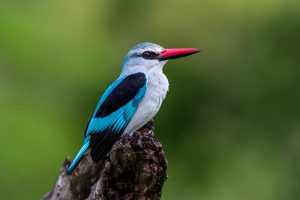Africa for the Birds
People don’t come to Africa to see birds.
At least, not on their very first visit. Most guests only have eyes for the “big” animals – elephants, lions, buffalo, giraffe, cheetah, zebra, even hippos. That’s no big surprise!
Then, after a day or two, they start looking at the other wildlife – like wildebeest, impala, kudu, eland, hyena, jackals and painted dogs. There are over 100 mammal species at Tasimba’s home camp, Linkwasha, so the viewing is always spectacular!
But then it happens – usually around day three or four of our week-long safari. You notice there are birds here! By the hundreds. Over 400 species in fact! And they are so beautiful, many of them like no birds you’ve ever seen before.

Birds like these, clockwise from top left: Carmine Bee-Eater, Lilac Breasted Roller, Yellow billed Hornbill and the Woodland Kingfisher. Or the Crowned Cranes in our top photo who, despite mating for life, still require the male to strut his stuff to impress his girl.




Show me more
Suddenly our guests want to see more. More ostriches, vultures, raptors, Kori Bustards (the largest flying bird) and Fish eagles (that look just like our Golden Eagle).
Our guides will show you the ‘suicide bird’ – the Red Crested Korhaan that, in order to impress a female, will fly up about 30 feet in the air then fold his wings and drop like a stone and then stick a great landing right in front of her. Or the ‘undertaker bird’ – Marabou storks, with their long gaunt face, slightly stooped walk, and long black wings on their back like a funeral director’s tailcoat.
And you’ll hear the constant birdsong of a hundred birds, with the iconic, repetitive lilting call of the Cape Turtle Dove as backdrop. Our guides will teach you too to understand the predator alarm calls which often the birds are first to sound.
Don’t get me wrong. You will still eagerly go out on safari drives and walks looking to see what nature has in store for us – and there is always something new and exciting. But, by the end of your week, you will likely be as eager to watch and listen to the birds.
On your next visit, we know you will still come to Africa for the animals.
But we think you may come for another reason too. For the birds.

